The iPhone 6 Review
by Joshua Ho, Brandon Chester, Chris Heinonen & Ryan Smith on September 30, 2014 8:01 AM EST- Posted in
- Smartphones
- Apple
- Mobile
- iPhone 6
CPU Performance
Now that we have a good idea of what the A8 SoC looks like, we can talk about performance. While we covered this in the preliminary article, it’s worth going over again. For those that are unfamiliar with our test suite the CPU-based tests are mostly browser-based benchmarks. Once again, although I’m not quite happy with the state of benchmarking things we’re getting close to a more platform-agnostic solution.
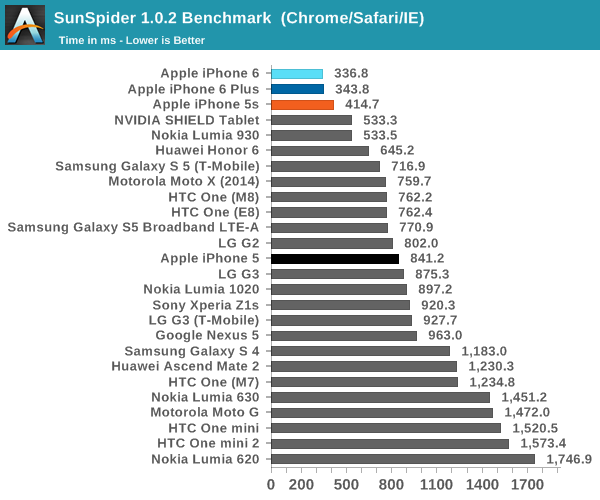
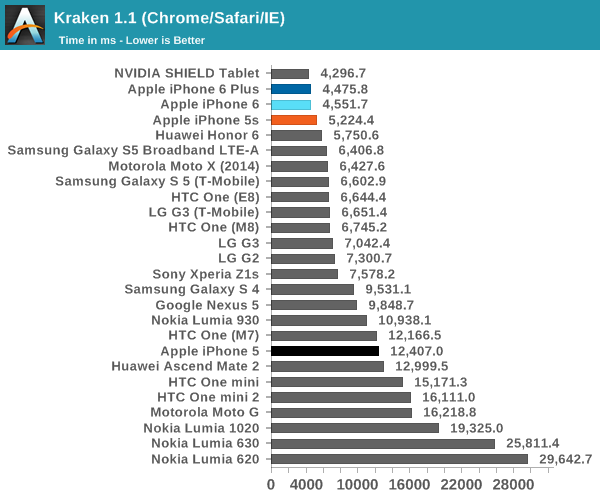
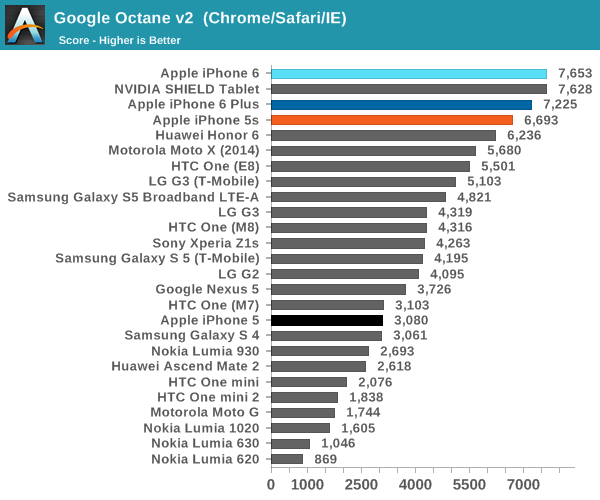
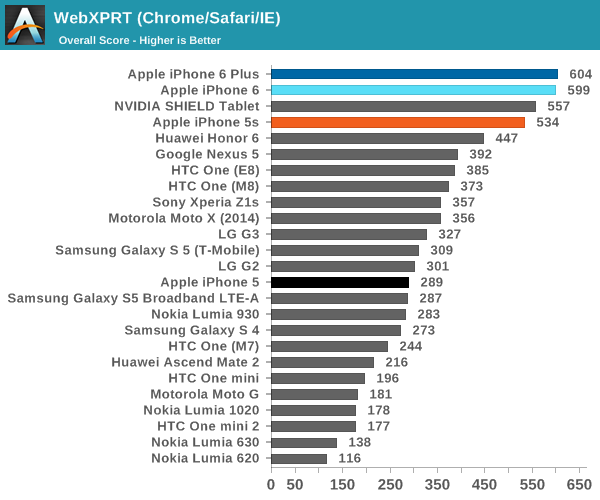
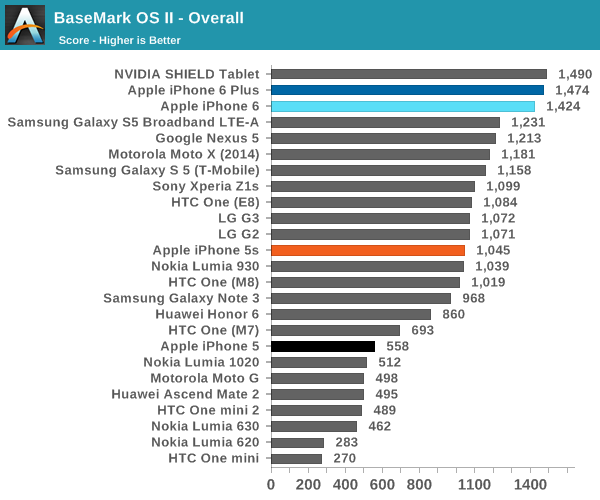
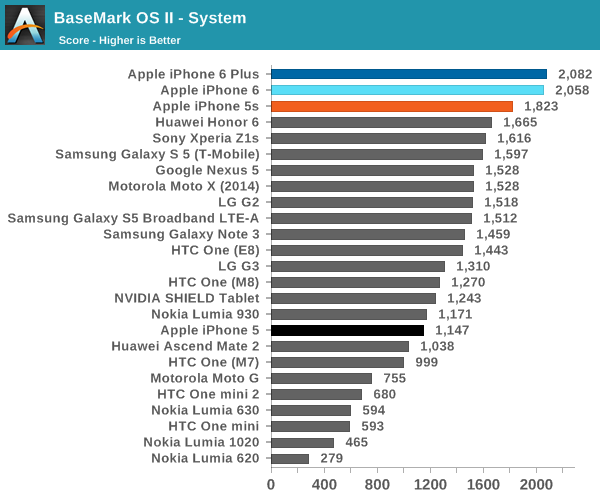
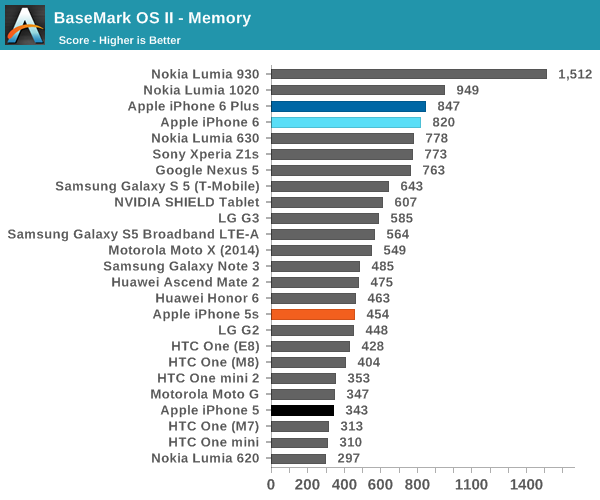
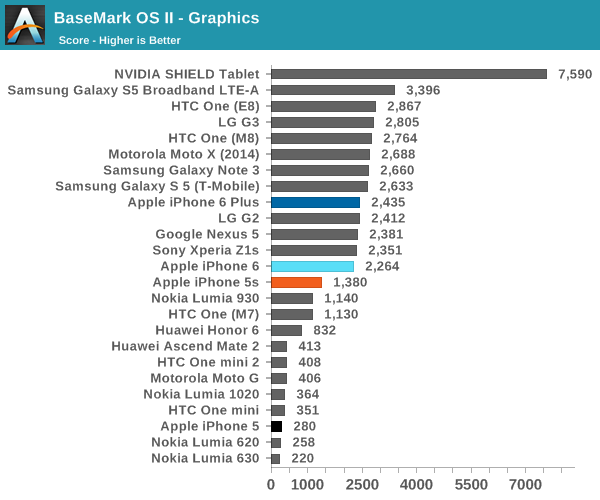
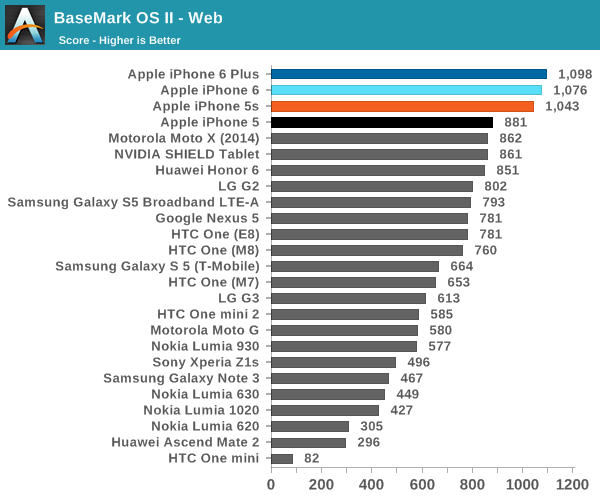
For the most part, the A8 SoC performs admirably despite the relatively low (1.38 GHz) frequency and half the cores when compared to competing SoCs. It seems that this is mostly building upon the lead that A7's Cyclone CPUs began. It remains to be seen if other SoC manufacturers will catch up in their CPU architecture at one point or another (NVIDIA's Project Denver in particular is interesting), but for now Apple seems to be quite far in the lead in CPU performance.










531 Comments
View All Comments
Toss3 - Wednesday, October 8, 2014 - link
Just because some people question the integrity of a website claiming to do objective measurements of a device's performance, doesn't mean that they are idiots. Quite the opposite in fact. It would be great if Anand changed the way they do their battery measurements (they do not reflect reality, and aren't comparable to other sites' results (should already be enough for them to question the way they do it)), and also dropped the browser benchmarks from the CPU performance section (browser performance != cpu performance, unless both phones are running the exact same version of the browser on the same platform (we know that chrome on iOS isn't the same as Chrome on android etc.)). And measuring the display brightness when setting the brightness manually also isn't ideal, as Samsung limits the peak brightness on their devices for those occasions, which means that the true peak is a lot higher (setting the brightness to automatic solves this issue(think quite a few people prefer auto to manual)).Toss3 - Wednesday, October 8, 2014 - link
Forgot to add that it would be great if they included a reference for the photo and video comparisons (D800 + color correction). There's also a big discrepancy between the time the photos were taken (around 8pm for all androids and 10pm for the iPhones (why is that?)).tralalalalalala40 - Wednesday, October 8, 2014 - link
To make it harder for the iphones under lower lighting to make the test more fair to droid phones.Toss3 - Thursday, October 9, 2014 - link
Lighting conditions should always be equal for all devices, and sometimes 10pm can be brighter than 8pm.tralalalalalala40 - Wednesday, October 8, 2014 - link
Samsung has to limit the brightness or else the pentile pixels will burn out quickly...How should they do the battery measurements? Apple has the most efficient SOCs and are destroying default QComm chips everyone is using.
Toss3 - Thursday, October 9, 2014 - link
Automatic brightness and normal usage would be best (playing a game for 2h - calling someone for 1h - browsing the web for 1h - installing 30apps, etc.). Being on both wifi and lte throughout the day.Toss3 - Thursday, October 9, 2014 - link
And the Exynos 5433 would like to disagree - currently on the launch firmware and already outscoring everything else (Geekbench scores over 1300/4300 and gfxbenchmark/sunspider numbers that match those of the iPhone 6). The 3DMark numbers are also higher than those of the iPhone 6.taehoon - Wednesday, October 8, 2014 - link
I want to know iphone6/6+ NAND performance test is based on 64 or 128GB.Because It is extremely higher than any other devices
Toss3 - Wednesday, October 8, 2014 - link
Why are you still running browser benchmarks when testing the CPU? You'd think that a site like Anandtech would know better (the difference between Samsung's own browser and Chrome is huge http://forum.xda-developers.com/showpost.php?p=557... How about running something like 3D Mark's physics benchmark instead? Basemark is a lot better than browser-based ones, but do we know if the benchmark performs equally on both platforms.tralalalalalala40 - Wednesday, October 8, 2014 - link
People commonly use the web browser on the device to browse the internet with their phone. Their other tests cover the 3D physics (which the iphone doesn't excel at, since most if the users of this phone aren't simulating physics problems).iPhone 6 is destroying the competition at the moment, samsung just dropped 10% in profits, they have to go back to making RAM, this might be their last high end phone release on android, they need to move to tizen.